"Now Luke, a true gentleman leaves no puzzle unsolved"
I praised the first Layton game to high heaven, and for good reason. Professor Layton and the Curious Village is a piece of art; it's charming, it's smart, it's puzzling (pun intended), it's impactful, it's long-lasting, and it's one of those games that will live on forever. Professor Layton, despite being a relatively new character in the realm of video games, will one day be spoken in the same breath as Mario, as Cloud, as Link, as Mega Man, as Ryu, as Pac-Man, and the rest of those names on the list of legendary video game characters. I honestly feel that strongly about this series, which has seemingly unlimited room to grow and adapt and evolve. Professor Layton and the Diabolical Box is the second entry in the series, and while it may not leave as long as an impression as the original, it's still a fantastic game and a necessity for anyone's DS collection.
 I said it once and I'll say it again: Professor Layton is to video games as Sherlock Holmes is to literature. The storyline in Professor Layton starts off simple enough, and then gets more and more complicated as we walk along its winding path. Mystery after mystery is discovered, plot twist after plot twist is revealed, and loveable character after loveable character is met. Nothing really compares to the universe in the Layton games, and it's really a wonderful story that needs to be experienced to be truly appreciated.
I said it once and I'll say it again: Professor Layton is to video games as Sherlock Holmes is to literature. The storyline in Professor Layton starts off simple enough, and then gets more and more complicated as we walk along its winding path. Mystery after mystery is discovered, plot twist after plot twist is revealed, and loveable character after loveable character is met. Nothing really compares to the universe in the Layton games, and it's really a wonderful story that needs to be experienced to be truly appreciated.Hot off the heels of their adventures in St. Mystere, Professor Layton and his apprentice Luke receive a letter from one of Layton's old professors. In the letter, the professor details a mystical artifact known as the Elysian Box that he has in his possession. The cursed box is rumored to kill anyone who dares to open it. This is exactly what happens to the professor, and his resulting death sends them on a long journey to discover the secrets behind the Elysian Box, plus they meet up with some old faces along the way.
I really enjoyed the returning characters from the first game and the continuity between the two games is remarkable. Many times video games, and really any form of medium, decide to leave it out little details that make the continuity a tad askew. Not the case here. Professor Layton and the Diabolical Box tells a perfectly crafted story, and as I mentioned, it should really be experienced by everyone.
The gameplay remains largely unchanged. The game is a point-and-click adventure game where players tap all over areas on the touch-screen in order to interact with other characters, find hidden puzzles, and also find hint coins. I did notice that while the puzzles in the first game seemed to just be random brain teasers to complete for fun, the puzzles in the second game are much more integrated into the storyline. Some of the puzzles are directly linked to things that Layton and Luke are trying to do, like rewiring electrical equipment to get an elevator working or making their way across a frozen pond.
It's interesting that the developers actually decided to try to make the puzzles make sense within the realm of storyline. Is it a bit ridiculous how obsessed the characters are with solving puzzles? Yes, but at least this time around they tried to make it make a bit more sense. It's appreciated, and it goes a long way with giving this sequel credibility.
There are differences in this game, though, don't get me wrong. It is indeed a sequel, and not just a carbon copy of the first game with a new story and new puzzles. Professor Layton and the Diabolical Box introduces a memo function to the series. In the first game, puzzle solving was done by writing on the touch-screen, right on the picture representing the puzzle.
The new memo function allows players to do this, but to also write on other puzzles that aren't math or word problems. This makes solving some puzzles easier, but there is a pretty irritating flaw with the memo function. There is no eraser. A player could write out a large solution to a puzzle and nearly have it solved, only to run out of room. The only way to get rid of the writing already on the memo pad is to erase all of it. A simple eraser function would have done wonders for the overall quality of the title.
Another issue I have is with the puzzle solving itself. Inevitably, not everyone is going to be able to solve all the puzzles. And not everyone is going to want to. Some puzzles are puzzles that require guess-and-checking. Guessing may take away points from the overall point total, but it's a necessary technique to get through this game. After every guess, though, the game shows a little scene of Layton or Luke either realizing they've solved the puzzle or realizing they've failed at finding the answer. A title card that flashes saying “CORRECT” or “INCORRECT”, followed by a fade-out and some text. This process takes somewhere from 20 to 30 seconds, which is a long time when you're trying to guess a bunch of times on a particularly difficult puzzle. I firmly believe a “quick-guess” mechanic should be added to the game, or at least the ability to skip through this stuff.
Besides this and the overuse of false hints, there really is nothing wrong with the game. It's not an improvement over the original, but it does manage to at least match it in overall quality. The only reason this game isn't receiving a perfect score is because it didn't fix some issues that the original had and also has created some of its own issues with the new memo feature. That being said, the game does manage to a do a few things that the original didn't in order to carve its own identity in the series.
Firstly, there is a lot more variety in the environments. The first game featured about two main areas of the game to explore. There was the town and then there was the tower. This sequel takes players to a few different locations. This greatly helps relieve any repetitiveness that would have otherwise brought the game down. While I'm talking about the visuals, I should note that the game still uses anime-inspired cut-scenes that are still gorgeous, with brilliant character models, top-notch animation, and overall perfection in this category.
Secondly, there is a lot more voice-acting present. I really enjoyed the voice-acting in the first game. All the characters are played brilliantly by their voice actors that it's really astounding. Voice-acting was reserved for the cut-scenes in the first game, but they also appear during key conversations throughout the title. This was a nice touch, and let players know that if there's talking, they really needed to play attention to the details being displayed. A lot of the old tunes make a comeback, including in the infamous musical number that pops up whenever you're trying to solve a puzzle. There is a lot more background music, though, and a lot of the soundtrack helps accentuate the emotional intensity in the game.
And finally, the Diabolical Box uses the DS's microphone. Does it use it often? No. But the simple fact that the game is trying to take advantage of all the DS's unique features is worth noting. There is a whole realm of new puzzles waiting to be solved using the microphone as well as other ways the DS can create gameplay, like with the dual-screen technology.
I have poured insurmountable hours into the Curious Village. I won't spend as much time with the Diabolical Box though, even though it has 150 brand new puzzles to solve. There is a bonus section like in the other game that opens the gateway to more difficult puzzles, concept art, and a secret door with a secret password code. There is a secret door in the first game, as well. By inputting a code found in the second game in the first game, players can open the door and find what waits behind. Not only does this add replayability to the Diabolical Box, but it also gives gamers a reason to dust off their old original professor Layton cartridge. I like this idea of games communicating with one another. Look at the Mass Effect games, for instance. Players wouldn't have played the first Mass Effect so much if it wasn't for the ability to transfer characters from ME1 to ME2.
Professor Layton and the Diabolical Box is a fantastic puzzle game for the Nintendo DS. The storyline is memorable and will stick with anyone who plays it long after the credits roll. There's plenty of content to keep players coming back, and the wonderful characters are beautifully designed. The voice-acting is top-notch, and just like Professor Layton is one day going to become a classic character, the music in this game will become classic music, butting heads with the themes to Mario and Zelda. Some gameplay issues need ironed out, but overall, Professor Layton and the Diabolical Box is one of the best games available for the DS. Pick this one up immediately.
NAME: PROFESSOR LAYTON & THE DIABOLICAL BOX
SYSTEM: Nintendo DS

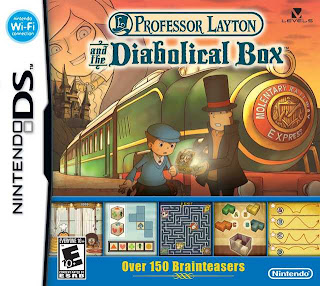
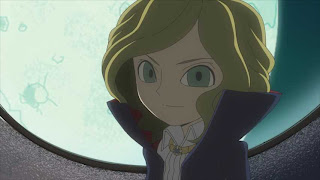

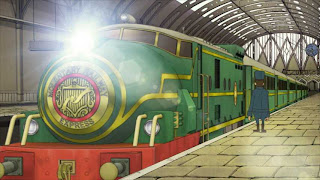

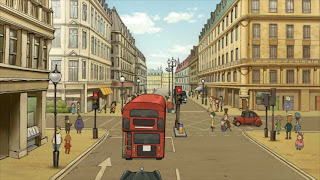
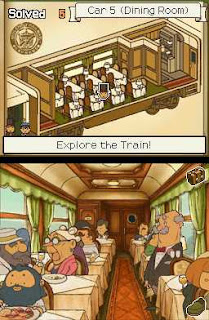
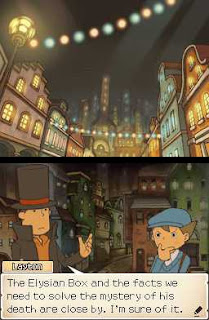
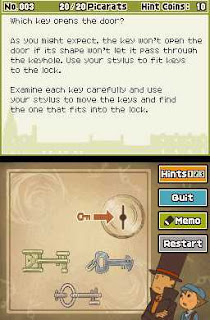
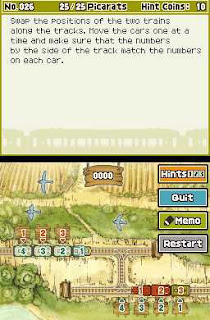

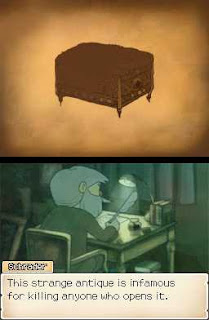


No comments:
Post a Comment